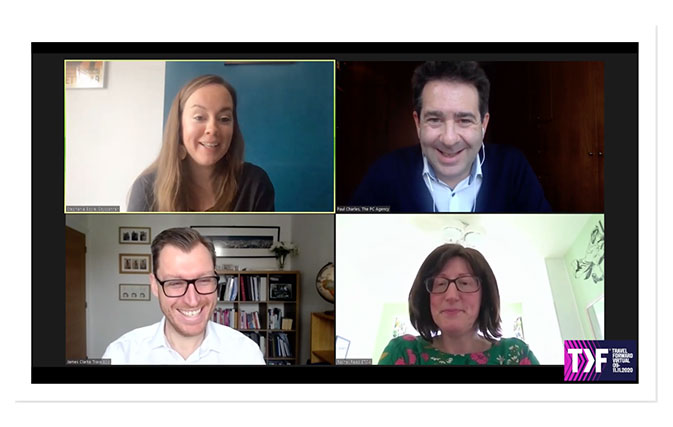LONDON — At WTM 2020, at a session appropriately dubbed ‘A Glimmer of Hope: Insights into the Recovery of Global Travel’, Skyscanner’s Group Head of Partner and Industry PR, Stephanie Boyle, offered some timely feedback for restarting travel in post-pandemic.
WTM is virtual this year and taking place Nov. 9 – 11. Organizers says this year’s virtual WTM event offers travel professionals the opportunity to come together to recover, rebuild and innovate the travel industry amid the COVID-19 pandemic.
Here are some of Boyle’s insights on pricing, booking windows, corporate travel and the recent U.S. election.
PRICING
Boyle says that even in the wake of the pandemic, price will still be a factor. “I don’t think price ever goes away,” she said, adding that the industry’s uncertainly over price points is just the latest question mark in a never-seen-before year. “If ‘unprecedented’ defined the first half of 2020, then ‘uncertainty’ marks the second half of 2020,” she said.
The conversation for anyone thinking of planning a trip now or in the months to come “will be focused on value and flexibility,” said Boyle. “There’s lots of pent-up demand out there and I think we will see that pent-up demand convert into bookings. Travellers will be looking for overall value. But the security around being able to make that booking will continue to be the biggest factor. And flexibility is going to be the new big word on everyone’s minds.”
BOOKING WINDOW
Analyzing Skyscanner’s metasearch travel booking data, Boyle says she’s seen a really big shift to a much shorter booking window – not surprising given these very up-and-down times. “We’re seeing a lot in the 7-30 day range, and also a lot in the last 7 days before flying.”
And travellers react quickly to travel news amid the pandemic. When Hong Kong and Singapore floated the idea of a travel bubble, search requests for travel between the two cities shot up 2,000%, she notes. She mentioned Canada too, saying that whenever there’s talk about Canada potentially easing its travel restrictions, searches trend up.
Even in a pandemic, “there are travellers who are less risk-averse who will convert very quickly” to making travel plans, says Boyle.
CORPORATE TRAVEL
It’s up to the travel industry “to define what business as unusual looks like”, and that includes corporate travel, says Boyle. “We’ve managed an entire year without it. It isn’t going to be the same. So what are airlines going to do? Reconfiguring cabins? Lots of incentivizing? Those big routes that are increasingly profitable for airlines, like New York – London, they’re going to need to rethink their strategy. There’s going to need to be a lot of innovation.”
THE U.S. ELECTION
Having President-Elect Joe Biden poised to take the reins in January 2021 was good news to Boyle. “Biden being in office is going to improve the reputation of the U.S. as an inbound destination for international travellers across the world,” she said.
Asked if having Biden in power could mean stricter travel restrictions for U.S. travellers, including a possible travel lockdown, Boyle had this to say: “In the short term, yes, it may mean some short-term change to the way the U.S. has been travelling. But if that helps stamp out the virus … that can be nothing but a good thing in the long term.”

